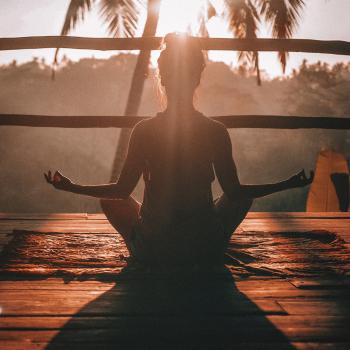Sharon Maas reached out to me to share this retelling of The Mahabharata that she has created. It is called Sons of Gods and is available at Amazon. Reviews praise this version as being a good way to get introduced to what can be a very complicated and confusing story! Ms. Maas also agreed to answer some questions about it for me. Here is her interview…
1) Tell us a little about your background. How did you discover The Mahabharata? What got you interested in Hindu history and philosophy?
I grew up in Guyana, South America, a small country with a large Hindu population. Though I came from a Christian/atheist background (my parents were atheist but their families were Christian) I was always fascinated by the colourful, gaudy even, pictures of Hindu gods and goddesses you’d see in the shops and market stalls. Later on, as a teenager, my best friend was a Hindu and I was able to experience first hand some of the ceremonies of that culture.
As I grew older, I felt a longing for something “more”. As a young journalist at my first job, I got to interview a Yoga teacher visiting the country, and that was it. I was hooked. My first Yoga lesson was utterly life-changing. I went on to borrow every library book I could find on Yoga, Hinduism, Vedantic philosophy, and educated myself. This was in the late 60s, early 70s.
Then in 1972 I found the book that was to set my on fire: it was about Ramana Maharshi, the eminent sage who had passed away in 1951. I had to get to his ashram. I begged, borrowed and worked for the money to get me to India. Finally I left in 1973, flying to England and from there overland to India with some Swiss friends.
It was while staying at the ashram—I was there for eighteen months – that I first read the Mahabharata. I couldn’t put it down – I was riveted and read it day and night. That was a big book, but I simply devoured it!
2) What led you to feel that there was space in the market for a new translation? What sets your version apart from others?
The book I first read told a magnificent story, but the writing itself was extremely simplistic – almost as if written for very young children. Also, I felt there were some flaws in the storytelling itself. I had always been a voracious reader of fiction so I had high demands. Though I could feel past the flaws to the story. I felt the need for a better version, one that brought the story alive. So I went on to read other versions.
Yet every version I read seemed to have some major flaw. In most cases it was the writing – such a magnificent book deserves magnificent writing! Mostly, the books I read were mere summaries of the great work, with very bland, lifeless storytelling. But when I found a book with exquisite writing – William Buck’s version – I found that the story was not cohesive, did not flow, omitted certain vital aspects of the “plot” and so on.
Every single version I read left me wanting.
But as I read all these different versions, I discovered that a new vision, a new understanding of the book was rising within me.
In “my” version, it wasn’t the Panadava brothers, Arjuna especially, who are the heroes of the story. It is Karna. I have placed him centre stage, made him the lynch-pin of the story. Without Karna there would have been no war, no Mahabharata. No other Mahabharata version makes this clear.
I felt this very strongly way back in the early 70s.
I began to write this version down back in 1975. Over the years I developed and improved it. One day, I decided to share my vision with others – that was in 2012, when I put a digital version of Sons of Gods online. By then it had been over 30 years in the making. Of course the writing isn’t as perfect as I would like it – I am NEVER satisfied! But by then I was a professional novelist and was able to restructure the entire book, add dialogue, scenes etc to bring the story to life, and so on.
3) Have you studied Sanskrit? How was your translation done? Is it like Ezra Pound with reworking previous translations to make them smoother?
It isn’t a translation—I know several words of Sanskrit but never studied it. It isn’t necessary for the Mahabharata – there are so many English versions, as well as a full translation of the original, that it’s possible to imbibe the story without knowing Sanskrit.
Some Mahabharata writers pride themselves on sticking close to the original version, not changing anything. I make no such claim; in fact, I have deliberately changed, subtracted, added elements to make the story “round” and alive.
We must remember that The Mahabharata was originally in the oral tradition, passed on from story-teller to story-teller. Each teller of the tale would almost certainly have been creative in the telling of it, used different words and so on. The main thing is the living story, wordless, at the centre of the tale.
4) The Mahabharata is a very long story. How did you choose which parts to include in your version?
The central story is actually quite clear, and it is this core narrative we find in all the condensed versions. As I had made Karna a central figure, I linked it all back to him.
I don’t think that cutting the original is necessarily a bad thing.
In modern novel-writing we writers are warned not to “pad” the story – too much of a good thing can dilute the essence of the story, thus hiding the spirit in a multitude of excursions, stories-within-stories, and so on. My aim was to find the essence and concentrate on that.
Besides, a work of that length (18 volumes) can be so intimidating that many readers wouldn’t even start. Even the two- and three-volume editions require a huge amount of time to finish. That whole version is out there if anyone wants to read it, but for an introduction, and an understanding of the spirit of the Mahabharata, a short version works better.
It was really a matter of picking out the essential scenes and characters, and weaving them together into a unified whole.
The amount of time you spent, Ms. Maas, is impressive! It probably takes at least 30 years to really get the story right. I appreciate the emphasis that you placed on Karna as a character. He is a tragic hero and someone it is very easy to admire as well as relate to.














